Main Content
Prepared by Bill Hlubik, Brendon Pearsall, Linnea Eberly, Trevor Styles and William Errickson
The Rutgers Beginner Farmer Training Program (AKA RU Ready to Farm) is seeking to evolve into an institutional NJAES program with demonstrable industry impact and integration of expertise and input from County Agents, successful farmers, and agricultural organizations across the state. During the three years the RU Ready to Farm program has been running, it has won multiple national awards, garnered the attention of news and media outlets, and directly impacted the total of 132 beginner farmers who have registered for the course. Currently, the program is entirely funded by the USDA-NIFA Beginner Farmer and Rancher Development Program grant, awarded in 2020. As this grant cycle draws to a close, program sustainability becomes an important factor for consideration. If the entire program were to rely on grant funding going forward, the future of the program would constantly be in jeopardy. However, with secure institutional funding in addition to grant and program income, the program’s core would be stabilized, allowing grant funds to be applied to larger, state-wide actions and collaborations. The success of the past three years demonstrates that this program is a vital part of statewide efforts to cultivate the next generation of New Jersey beginner farmers to help insure agricultural viability.
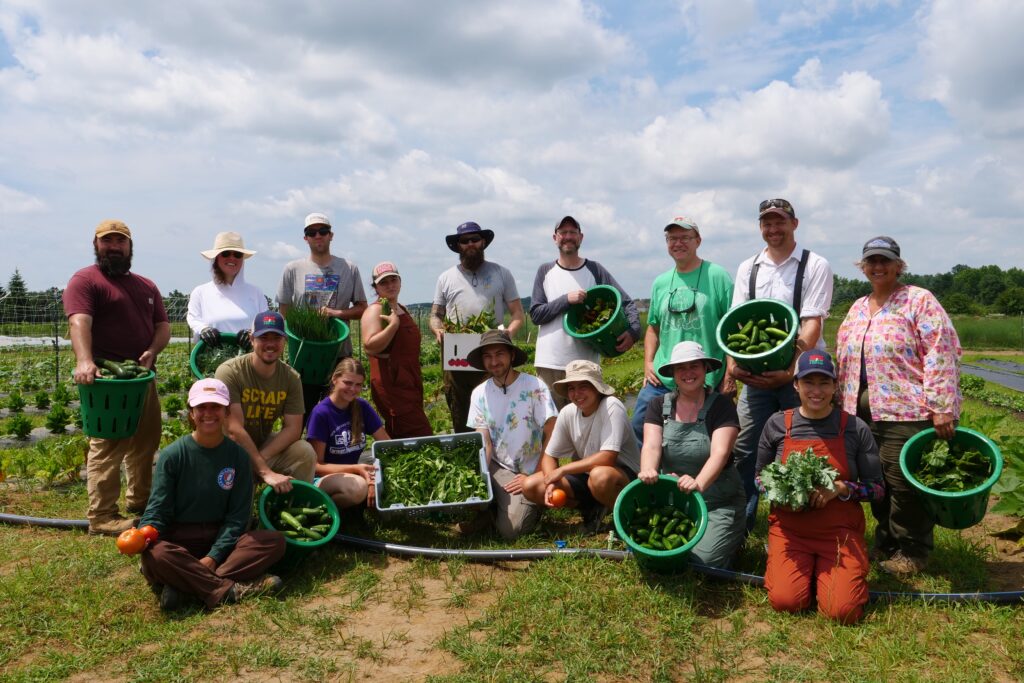
Overview
RU Ready to Farm launched in 2020 with funding support from the USDA-NIFA Beginner Farmer and Rancher Development Program. The program was designed to provide comprehensive education and hands-on training to new and beginner farmers while creating a pathway for them to start their own farm business. The team behind the RU Ready to Farm Program set out to address the barriers that prevent new and beginning farmers from achieving success in the agriculture industry. To date 132
students have joined the program, 21 of which have completed the on-farm training component with another 8-12 expected to apply for next season’s training. Of these 132 participants, 34 are currently farming to some degree on roughly 600 acres across 4 states.
In the past 3 years, a significant amount of the program has been dedicated to direct student interaction. This has included:
- 12 Farm tours
- 40 hours of recorded online instructional content
- Over 100 hours of online interaction in the form of office hours, meetings, check-ins,etc.
- Over 300 hours of on-farm training and instruction
- And many more hours of answering questions, reviewing business plans, assessing farm properties, sharing resources, and providing encouragement.
This high degree of student interaction has translated into impacts and outcomes that havebeen recognized at the regional and national level. The RU Ready to Farm Program has been honored with six NACAA awards, including being chosen as the overall national award winner of the 2023 NACAA Search for Excellence award in the “Young, Beginning, or Small Farmers/Ranchers” category.
Student Demographics
Student diversity has been a hallmark of the Beginner Farmer Program since its inception. Beginner farmers as a population are more diverse than traditional farmers in New Jersey, and our efforts to promote the program through the Office of Urban Extension and groups like NOFA-NJ and the Food Democracy Collaborative have helped us to attract a significant amount of women beginner farmers as well as farmers from a wide range of ethnic minorities. Based on data collected from program intake surveys, 58.33% of respondents identified as female and 56% identified as a member of an ethnic minority.
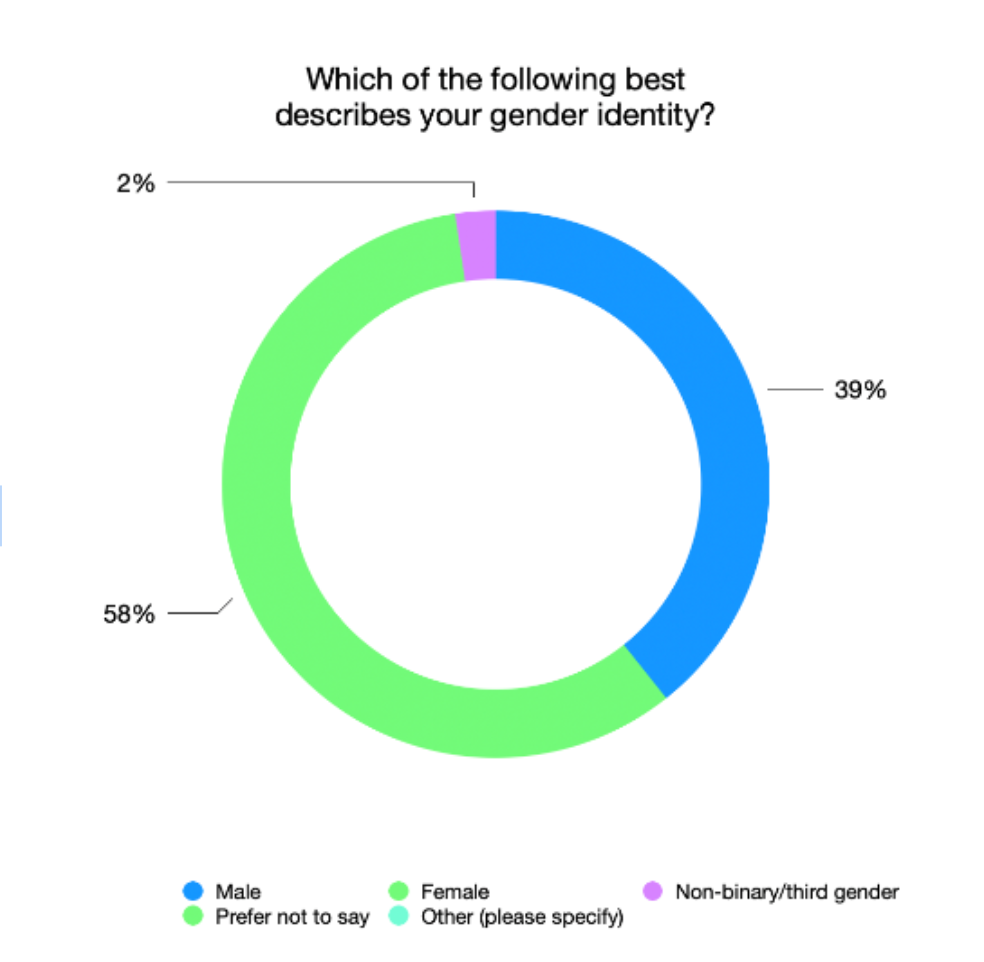
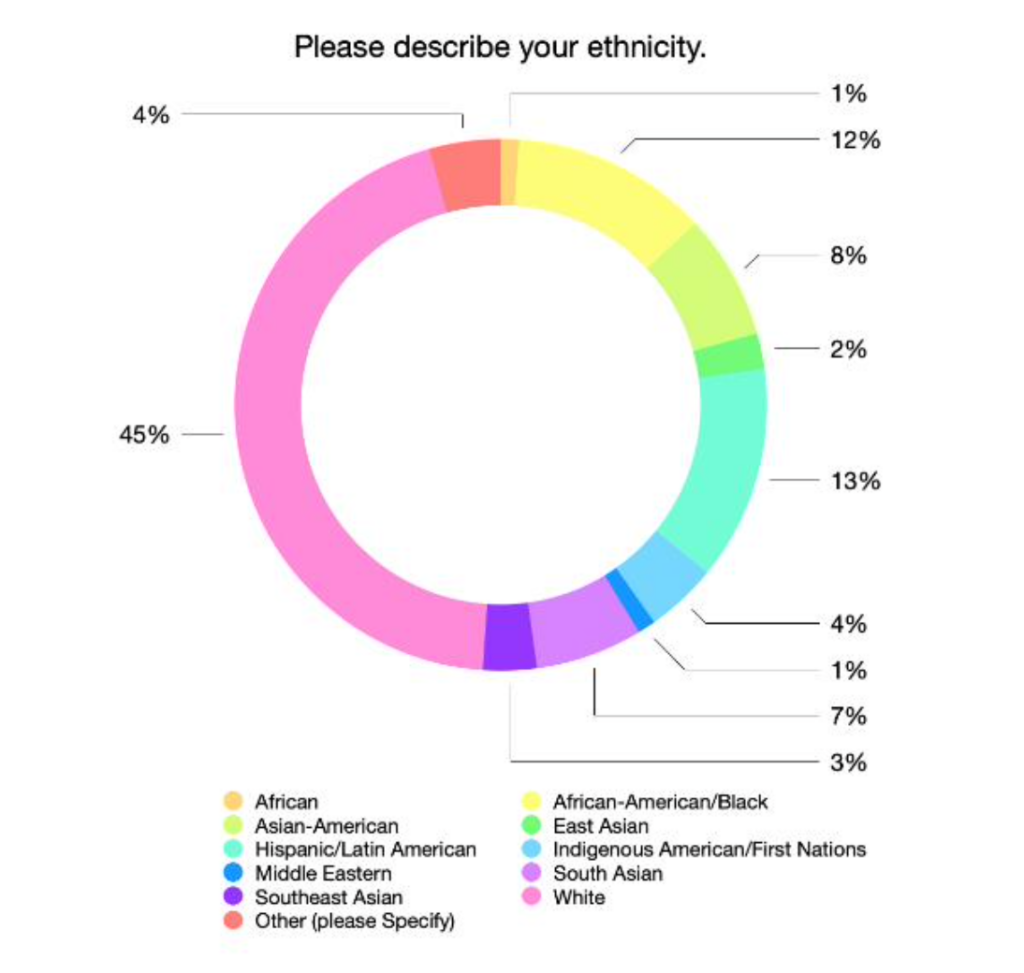
This diversity has been a major strength for the program and has helped to foster a community of cooperation and collaboration among our students. These diverse participants bring a wide range of knowledge and skills to the program that we would not have access to otherwise. This includes knowledge of unique ethnic crops, innovative approaches to marketing, awareness of communities with a demand for specific products, and various trade skills and professional knowledge that complement the program. This has resulted in a robust culture of peer-to-peer learning where the students are not only learning from program staff, but also from each other in ways that often lead to future friendships and business collaborations.
Impact and Student Interaction
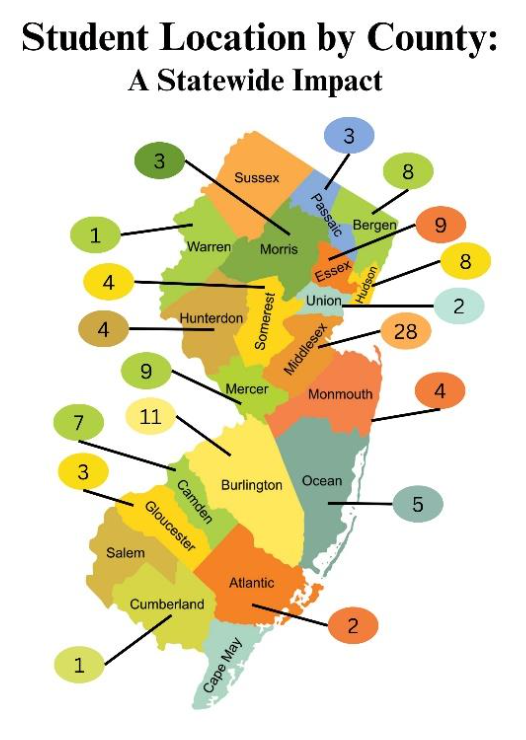
The success of the Beginner Farmer Program is based in its frequent and ongoing interaction with its students and the sense of community that this continued interaction fosters. Some students that joined the program when it launched in 2021 are still involved to this day, regularly attending farm tours, volunteering to help at workdays, and supporting the new students that have joined the program since then. By the time they make it to their third year in the program the average student has been the recipient of:
- Nearly 40 hours of online video lectures and training.
- 20+ hours of “office hours” Q&A interaction withprogram staff.
- At least 4 in-person farm tours of 4-6 hours each
- At least 200 hours of on-farm training as part of theyear 2 CSA Training program
- 20 hours of online check-in and crop planning sessionsas part of year 2
- As requested meetings with program staff to discuss business plans, evaluate farm properties,and ask questions about course content.
- Ongoing discussion threads and chat groups with program staff and peers where they can share resources, ask questions, and coordinate farm activities.
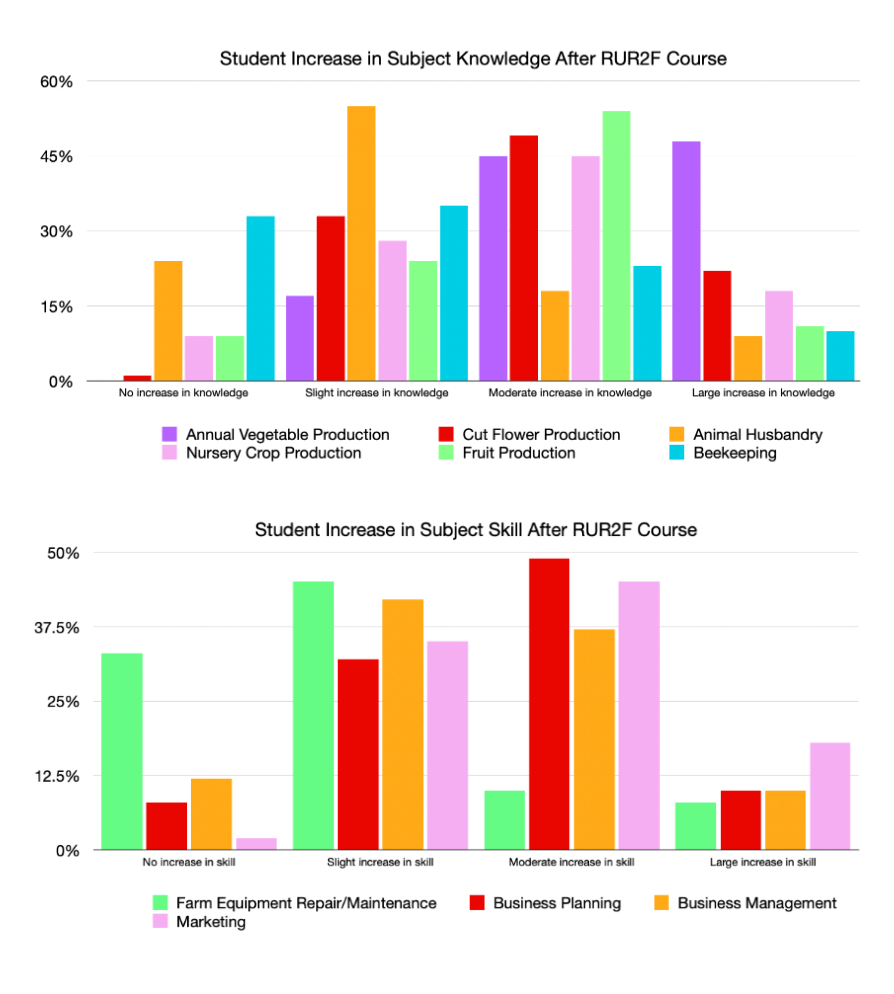
As a result of this comprehensive program engagement, our students have reported significant increases in knowledge and skills associated with our main educational focus areas. This data has been collected through follow-up surveys and is one of the main metrics that we report to the USDA. In annual vegetable production in particular, every student surveyed reported an increase in knowledge, with over 80% of them reporting a moderate to large increase. For the skill sets addressed by the program, 90% reported increases in the topic areas of Business Planning, Business Management, and Marketing.
Regarding the experience level of incoming students, out of 89 respondents, 54 indicated that they had no past farm experience, while 35 had some degree of experience. The amount of experience varied, with 1-3 years being the most common, though 8 students reported 4 or more years of past experience. Based on interviews and discussions with students, 34 program participants are currently farming in some capacity on an estimated 600 acres of land. The level and types of farming vary widely, with some students growing on a quarter or half acre, some producing on 5-10 acre homesteads, and others owning larger scale properties of 40-60 acres or more. Types of enterprises include:
- Market Garden Fruit and Veg
- Specialty Cut Flower
- Small livestock – Goat, Chicken,Quail, Sheep
- Indoor Mushroom
- Specialty Herbs
- Edible Flowers
- Tree Fruit and Nuts
- Native Plant Nursery Crops
Students also regularly find employment opportunities at farms and ag organizations around the state. Some of the farms and organizations that have hired or provided land to our beginner farmer students include:
- Marchese Farm
- Snapping Turtle Farm
- Moonshot Farm
- Duchess Farm
- Giamarese Farm
- Spring Wind Farm
- One of our students was employed by Jersey Fresh Farm to School after joining the program.
- Another student is now the farm manager of the Rolling Harvest Donation Rows at Gravity HillFarm.
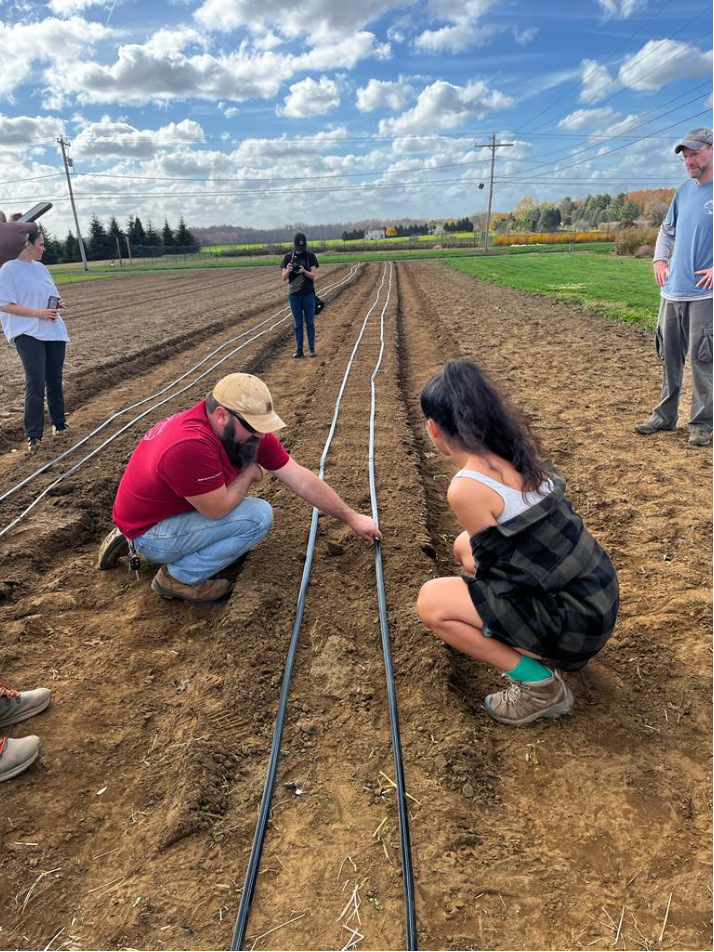
Student Feedback
Survey Feedback:
- I felt this was a wonderful program and was exactly the direction I needed
- The knowledge and willingness of the staff to help and offer advice is tremendous and plan tocontinue these relationships.
- I enjoyed the camaraderie and sense of community that developed immediately in the fellowshipof like-minded people.
- This program has been incredibly valuable to our plan to start our own farm business. I’ve learned so much in the first two years, I’m looking forward to what I can learn in year three.
- Overall, it gave me a great steppingstone to getting my agriculture career off the ground.
- I learned a lot during this program. All of the virtual lectures were helpful, the in person visitswere extremely valuable and the office hours were very beneficial. I would highly recommendthis program to anyone even considering starting a farm business.
- The knowledge gained from the Beginning Farming course was huge. I look at properties largeand small and can see many possibilities.
Testimonial:
Nick and I can’t emphasize enough how instrumental this program has been for us. We embarked on this journey with a dream of starting our own farm business, and RU Ready to Farm has provided us with the tools, knowledge, and support to turn that dream into a reality. The personal guidance and mentorship we’ve received have been priceless.
This program is a beacon of hope for those of us who are passionate about farming but lack the experience. It’s a testament to the commitment of Rutgers University and the agricultural experts behind it to empower the next generation of farmers. We are immensely grateful for the financial support from the U.S. Department of Agriculture’s Beginner Farmer and Rancher Development Program, which has made this program accessible to individuals like us.
If you’re considering a career in farming in New Jersey, I wholeheartedly recommend the RU Ready to Farm Program. It’s not just about learning; it’s about gaining the confidence, skills, and network you need to thrive in the world of farming. Nick and I are proof that this program can turn aspiring farmers into successful, self-reliant entrepreneurs. Thank you, Rutgers University, for helping us say yes to a very important question, “RU Ready to Farm?” We certainly are, thanks to you.
Additional Statistics
Value of crops produced by our beginner farmers:
- In the past two years the total value of produce grown and distributed by our on- farm training program is roughly $30,000.
- In the past two years we have donated over 2,500 lbs. of produce to food banks and pantries in Central New Jersey. The main recipient of these donations is Replenish, the Middlesex County Food Bank.
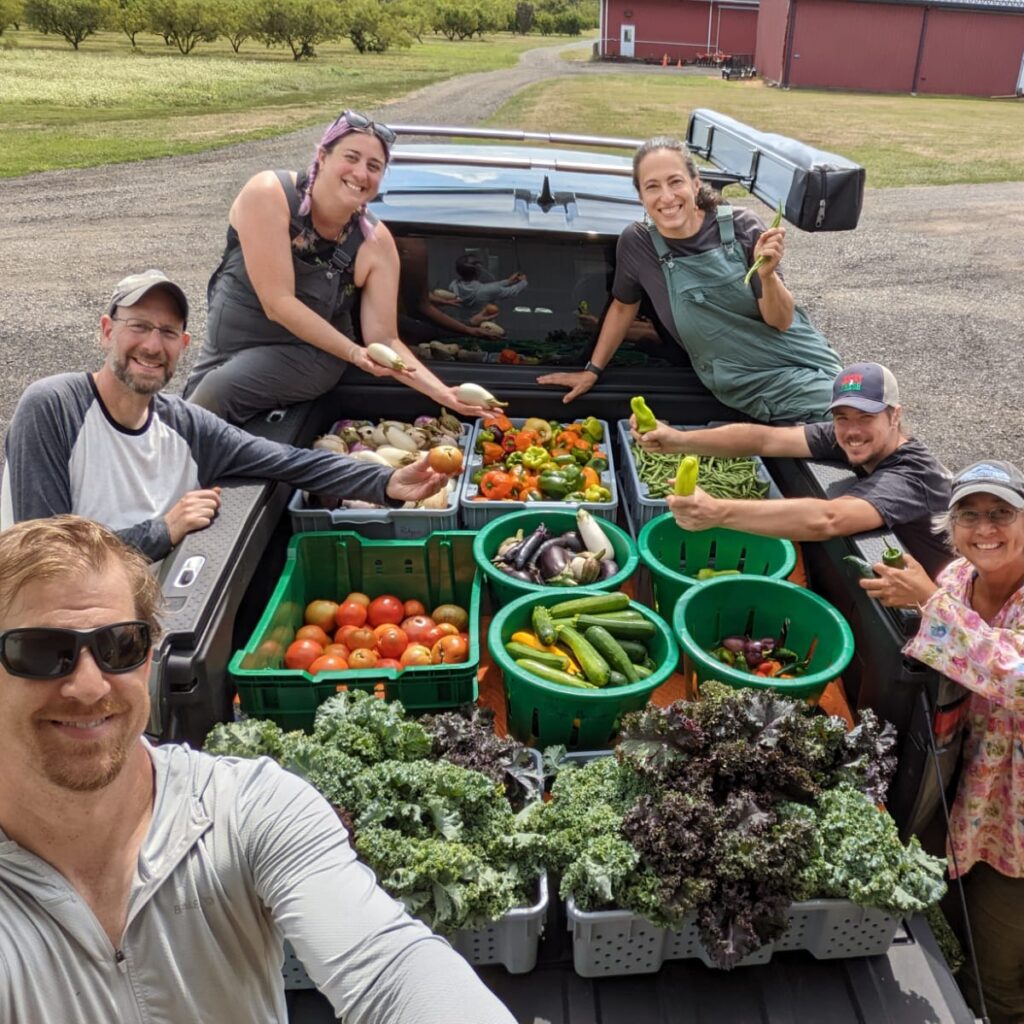
Total funds secured to date:
- USDA funds original and supplement:
- 2020 – Beginner Farmer and Rancher Development Program Grant – $515,464
- 2021 – BFRDP Covid Supplement – $200,000
- Program Income:
- $47,000 from online course registration
- $16,800 from on-farm training registration
- $26,200 from CSA Share sales
- Donations through Rutgers foundation account: $8,600
Social Media:
Social media has been a major component of our outreach and engagement. In 2021 we started Facebook and Instagram accounts that have been used to promote the program, share resources with other organizations, and highlight the activities of the program. Today we have 372 followers on Facebook and 658 followers on Instagram.
Collaborators
Farmer Presenters
- James Klett – Fairgrown Farms
- Steven Specca – Specca Farms
- Tim VonThun – VonThun Farms
- Bob Vonthun – VonThun Farms
- Larry Kuser – Fernbrook Farms
- Jim Giamarese – Giamarese Farm
- Allison Akbay – Snapping Turtle Farm
- Candice Howard – Duchess Farms
- Leah Ducey – Spring Wind Farm
- Alex Stein – Good Earth Nursery
- Rebecca Kutzer-Rice – Moonshot Farm
- Rose Robson – Robson’s Farm
- Mike Hlubik – Hlubik Farms
- Ray Hlubik – Hlubik Farms
- Fred and Kim Cattani – Cattani Farms
- Jen LaMonaca – Walking Bird Farm
- Brett Bullock – Bullock Farms and Screaming Hill Brewery
Rutgers Collaborators and Instructors
- Alex Sawatzky – Rutgers Student Farm
- Kate Brown – RCE Burlington
- Meredith Melendez – RCE County Agent Mercer
- Pete Nitzsche – Snyder Farm, RCE County Agent Morris
- Megan Muehlbauer – RCE County Agent, Hunterdon
- David Specca – Specca Farms/Rutgers EcoComplex
- Kris Holmstrom – NJAES Vegetable IPM
- Dr. Andrew Wyenandt – Extension Specialist in Vegetable Pathology
- Hank Bignell – Rutgers SEBS Animal Science
- Ashley Pierce – Cornell Extension
- Robin Brumfield – Extension Specialist in Farm Management
- Madeline Flahive DiNardo – RCE County Agent Union
- Dean Polk – Director of Rutgers Specialty Crop Research and Extension Center/Fruit IPMProgram
- Dr. Joseph Goffreda – Rutgers Fruit Tree Breeding Expert
- Dr. Thierry Besancon – Extension Specialist in Weed Science
- Dr. Wesley Kline – RCE County Agent Cumberland
- Jenn Matthews – RCE Program Coordinator
- Justine Gray – RCE Program Associate Mercer